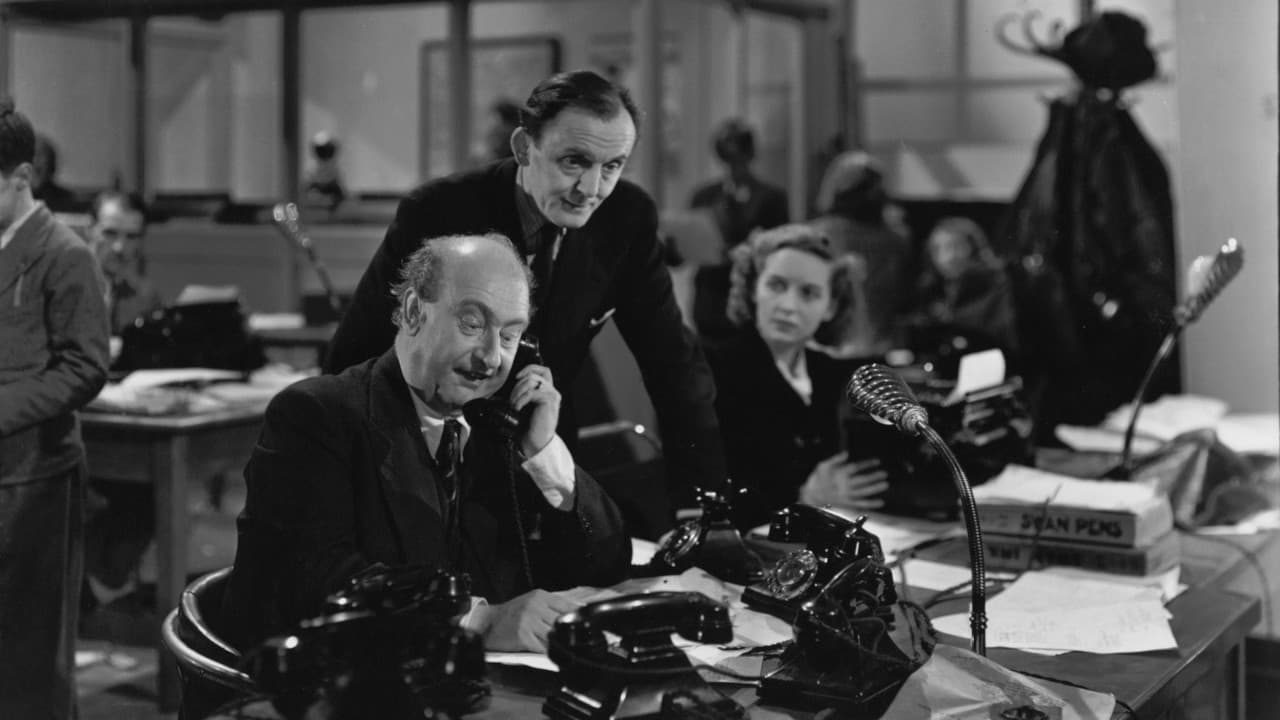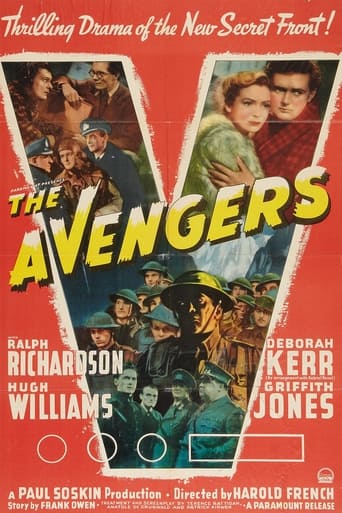

The purpose of many of the films made during WWII was to rouse the people in favor of the war effort....a sort of positive propaganda effort. And, when it comes to this goal, few pictures do as well as "The Day Will Dawn" (also called "The Avengers").The story begins with the Nazi invasion of Poland. The scene opens up in a newspaper office and folks are excited about the UK finally being at war...but also concerned that the British government has so far done nothing to check the Germans. One of the reporters, Colin Metcalfe (Hugh Williams) is sent on assignment to cover Norway. This is before the German occupation of the country, but Colin is concerned by the actions of the supposedly peace German seamen...he sees them as preparing for the invasion of Norway. His attempt to warn the British government and people is twarted however....and later he finally gets the chance to redeem himself....by sneaking back into Norway and helping his air force to locate and destroy a secret German submarine base.The film has a pretty good cast. In addition to Williams, Ralph Richardson, Deborah Kerr (in one of her first films) and Finlay Currie also are there to provide excellent support. As far as the rest of the picture goes, it's near perfect and very well made....aside from the overuse of bad (scratchy) was stock footage.
... View MoreI'm sure that the opening credits thank the "Royal N O R W E I G A N Government" - i.e. they misspell Norwegian.Is this some archaic spelling, is it a goof, or are my eyes playing tricks on me? (This was on the TV this afternoon so I couldn't rewind to check, sorry!)Otherwise I thought that the film was OK, for a bit of wartime propaganda. Not exactly in the league of In Which We Serve, and obviously not as "balanced" as post-war films such as "The Cruel Sea", but the performances were largely OK and the script not too "tally ho chaps". Some of the stock (?) footage and props were a bit flaky, but that's not surprising, there was a war on, you know...
... View MoreBritish wartime propaganda film in which Hugh Williams plays a British foreign correspondent investigating German U-boat activities in Norway. The disparate elements of the film however, in terms of location, narrative and character, do not seem to have been successfully combined into a cohesive whole. Apart from the Hugh Williams character there is a lack of focus, and the film comes across as episodic and disjointed. Ralph Richardson, for example, is for the most part wasted in a role which despite popping up briefly all over the place, seems to have very little relevance to either plot or theme. Finlay Currie, always worth watching, does well by his part and has the most convincing accent of the piece, but Deborah Kerr sounds as Norwegian as praties. Francis L Sullivan trots out another of his well worn villains.
... View MorePossible spoilersThe technical limitations of the cinema in the early forties meant that it was not possible at that date to portray battle scenes with any degree of convincing realism; many of what we now remember as great Second World War films were made in the fifties and sixties, long after the war itself had finished. Nevertheless, film-makers in both Britain and America were keen to show their patriotism by making propaganda films in support of the war effort. A popular way of doing this was to concentrate on the struggles being waged by European resistance movements against Nazi occupation, as the small-scale guerrilla actions involved in these struggles were easier to show than full-scale battles. This led to British films such as 'The Foreman Went to France', 'One of our Aircraft is Missing' (set in Holland), and 'Went the Day Well', which features British resistance to a fictitious German invasion. There were also American equivalents, such as 'The Moon is Down', (set in Norway), 'The North Star' (set in the Ukraine) and, most famously, 'Casablanca', set in French Morocco. 'The Day Will Dawn' falls within this tradition. Colin Metcalfe, a young journalist, is parachuted into occupied Norway to help the Norwegian Resistance destroy a U-Boat base in a fiord. Metcalfe is familiar with the area, having previously been his newspaper's Norwegian correspondent, and volunteers for the mission partly out of patriotic zeal to 'do his bit' and partly in the hope of rekindling a romance with Kari, the beautiful daughter of a local fisherman. To his horror, however, he finds that Kari is now engaged to be married to Inspector Gunther, the unpleasant pro-Quisling chief of police for the district. The plot unfolds in the best 'Boy's Own' tradition, with Metcalfe and his heroic Norwegian allies battling the dastardly Nazis.'The North Star' is admittedly a ludicrous and distasteful attempt to whitewash Stalinism, but some of the above films- particularly 'Casablanca' but also, in my view, 'Went the Day Well?'- are today classics. 'The Day Will Dawn', however, does not fall into that category. No doubt it was well received in its day by audiences who enjoyed its celebration of British (and Norwegian) daring and determination and its message that the Nazis could be beaten, but it is today no more than a mediocre period piece. It was obviously shot quickly, and on a small budget. The acting is unmemorable; the best-known cast member is Deborah Kerr, as Kari, but this is one of her weaker films. In some of her other early films, such as 'Love on the Dole', she showed great promise, but she gives little hint here that she would go on to become a major Hollywood star. The main reason, however, why the film fails to convince today is that it seems too much like heavy-handed propaganda to be entertaining. Like a number of propagandist movies ('The Green Berets', set in Vietnam, is another example that comes to mind) it makes the mistake of going over the top. By this I do not mean that it exaggerates Nazi brutality, as the real Nazis were every bit as bad as those depicted in the film, and worse. I mean that the film never misses an opportunity to score propaganda points, even when this is to the detriment of the story. For example, almost as soon as Metcalfe lands, his life is saved when an anti-Nazi Austrian soldier not only allows him to escape, but even tells him how he can make contact with the resistance. The authors clearly wanted to imply that all Austrians were anti-German, ignoring the fact that many actually supported the Anschluss, and that even those who opposed it often did so because they were against Nazism, not against the principle of union with Germany. No doubt there were many Wehrmacht soldiers who disliked the regime for which they were fighting, but few if any of these would have risked execution for treason or dereliction of duty by deliberately failing to capture a British agent. The Resistance would certainly not have revealed their secrets to anyone in German uniform. Similarly, it seems unlikely that a Resistance fighter would have drawn attention to his pro-Allied sympathies by keeping a portrait of George Washington in his home, or that the general population would have given such open support to attacking British troops. To do so, given that the attack was merely a commando raid rather than final liberation, would have been to invite bloody retribution once German forces had re-established control of the area. The villains are not only wicked but also cowardly and physically unattractive; the senior German officer, for example, is so grotesquely fat that in real life he would doubtless have been rejected as unfit for military service. The treachery of the Quisling Gunther is explained by the fact that he is himself half-German, with the implication that no pure-blooded Norwegian would have betrayed his country. The occupying German troops all speak fluent Norwegian; this is explained by saying that, as children, they took refuge in Norway from the First World War. The idea, of course, is to try and add the sin of ingratitude to the other crimes of which the Nazis are guilty. Unfortunately, this supposed historical episode is completely fictitious. Watching 'The Day Will Dawn', it struck me that Dr Goebbels was not the only person in 1942 who was distorting the truth for political ends and that a film made in a good cause is not automatically a good film. 5/10
... View More